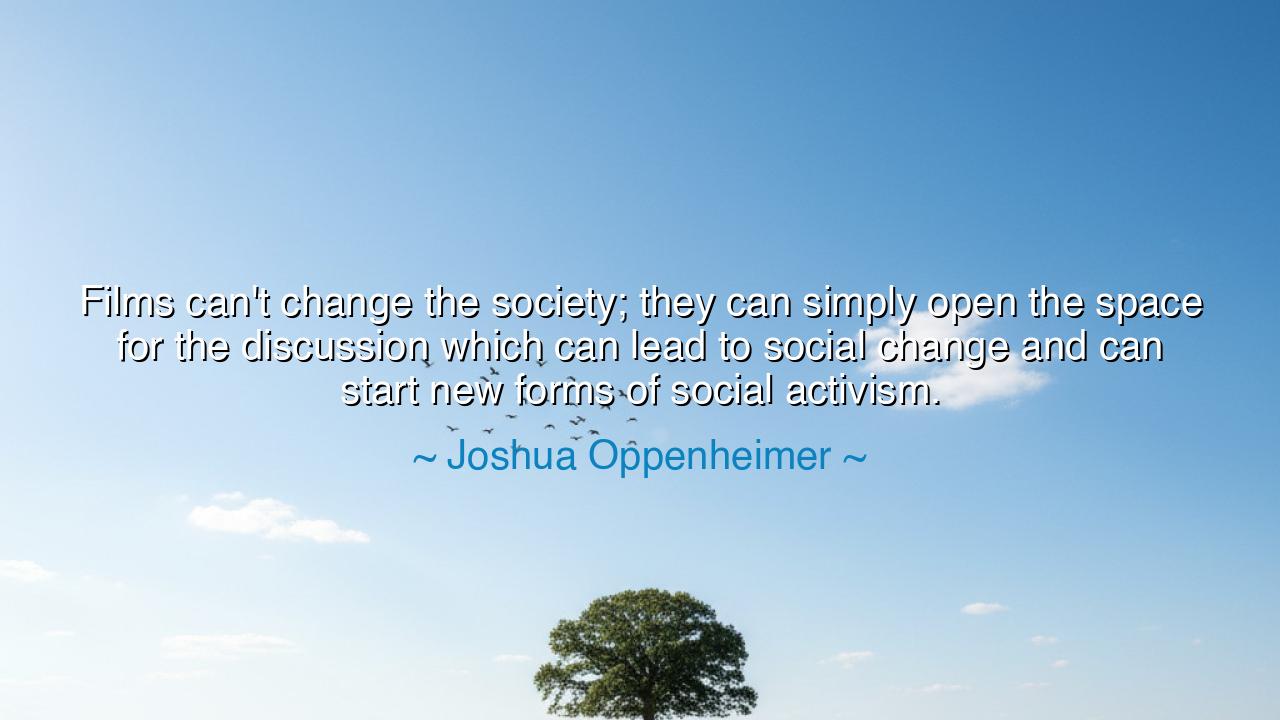
Films can't change the society; they can simply open the space
Films can't change the society; they can simply open the space for the discussion which can lead to social change and can start new forms of social activism.






O seekers of wisdom, gather close, for I bring you words spoken by Joshua Oppenheimer, a man whose work in film and storytelling has challenged the very foundations of society and history. He said: "Films can't change the society; they can simply open the space for the discussion which can lead to social change and can start new forms of social activism." These words carry a powerful truth, one that transcends the medium of film and touches the deeper purpose of all art. A film, or any form of art, is not a magic key that unlocks immediate transformation in society, but rather a spark—a seed that has the potential to ignite thought, to stir the soul, and to open the hearts and minds of those who experience it. Through this discussion, the foundations of social change are laid.
In the ancient world, the storytellers were revered not because they held the power to immediately change the world, but because their tales could stir the minds and hearts of those who listened. The Greeks, in their grand theatres, understood that drama was a vehicle for deeper reflection. Plays like Sophocles' Oedipus Rex or Aeschylus' Oresteia did not directly alter the course of the world but opened a space for debate about justice, fate, and human nature. These ancient works served as a mirror to the society, reflecting its flaws, its struggles, and its aspirations. Through theatre, they invited the audience into a dialogue—a dialogue that, over time, helped to reshape the values of the people and, eventually, their laws and behaviors. So too, does film have the potential to open a space for reflection and discussion, though its power lies not in the immediate effects but in the conversations it sparks.
Consider, O children, the great works of art in history that have opened such spaces for discourse. The mighty epics of Homer, the tragic plays of the Romans, and the poetry of Rumi all sought to open the hearts of people and challenge them to see the world in a new light. They did not demand change with the force of a king’s decree or the edge of a sword, but rather invited their audience into a space of reflection, where, through contemplation, change could take root. Joshua Oppenheimer’s words echo this ancient truth: that art—in this case, film—is not a weapon of instant transformation, but a tool for fostering the discussions that will ultimately lead to action.
The film The Act of Killing, directed by Oppenheimer, is an example of how art can open the space for difficult, painful conversations. The film explores the horrific genocide in Indonesia, not through a traditional documentary lens, but through a creative, daring portrayal that confronts the perpetrators with their past. It does not preach, nor does it demand that society immediately correct its wrongs. Instead, it opens a space for reflection, forcing those who watch it—and, in some cases, those who are involved in it—to face the consequences of their actions. It stirs the conscience, it awakens dialogue, and from that dialogue, the seeds of change may begin to take root. The film does not bring about the change itself; rather, it acts as a catalyst for the discussions that will shape the future.
History is full of moments where art—whether through theatre, literature, or film—has acted as a mirror to society, inviting it to confront its darkest truths and its greatest hopes. Consider the civil rights movement in the United States, where the songs and literature of the oppressed played a crucial role in stirring empathy and opening the hearts of the public to injustice. Films like "Selma" and "12 Years a Slave" did not immediately change the laws, but they opened the hearts of millions to the realities of racial injustice. They invited us into a dialogue—and through that dialogue, we began to see the need for social change. They did not impose change, but they created the space in which change became possible.
O children, the lesson is clear: art—whether through film, literature, or music—holds a unique power. It cannot directly change the world, but it can open the space for discussions that can lead to profound change. Like the storytellers of old, like the philosophers and playwrights who challenged the beliefs of their time, so too does art challenge us to confront the world as it is and imagine what it could become. The art we create or consume does not demand action but invites it, for it is in the space between the creation and the contemplation that the seeds of social activism are planted.
Thus, O seekers, let this wisdom guide you: do not wait for the world to change on its own. Create the space for discussion, for through reflection and dialogue, the change you seek will begin to manifest. Whether you are an artist, a thinker, or a member of society, recognize that you have the power to open the spaces where the world can reimagine itself. Like the great works of history, let your actions—your words, your creations—serve as catalysts for the dialogue that will shape the future. The change begins not in the action itself but in the spaces you create where people can come together and challenge the status quo. Through this, you will become a force for transformation, just as the artists, philosophers, and leaders of the past have been.






AAdministratorAdministrator
Welcome, honored guests. Please leave a comment, we will respond soon